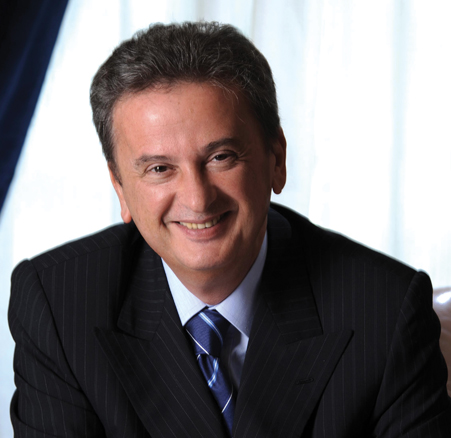Lebanon’s Middle East Airlines may be the only flag carrier in the world whose in-flight entertainment includes a film that focuses on the host city's central bank. The film – a history of Banque du Liban – concludes with a slide in bold lettering, declaring governor Riad Salamé to be the “absolute master of the Lebanese pound”. It’s a curious ending for a documentary, but not completely fanciful.
Putting the film on the playlist speaks of the pride that Lebanon takes in its central bank, a rare source of stability in turbulent times. Governor since 1993, Mr Salamé is a national figure in Lebanon, where some taxi drivers say he should be running the country. He is qualified to do so, technically speaking. The country’s complicated constitution stipulates that only a Maronite Christian may be president, and Mr Salamé is a Maronite.
He himself has expressed no presidential ambitions and, indeed, his effectiveness in his current job depends on the perception that he is above politics. Yet Lebanon has not had a president since May 2014, nor a properly working government for somewhat longer. So Mr Salamé and his bank, one of the few functional state institutions left in the country, have moved into this political vacuum to assume a form of economic leadership.
Tight controls
“Lebanon has three major sectors that can lift the economy in the future,” says Mr Salamé, a former Merrill Lynch banker. “They are finance, the knowledge economy and, whenever it becomes feasible, oil and gas. They need backing.”
Of those, his first concern is for a sound banking system. Under the central bank’s direction, the capital adequacy of Lebanese banks has risen to more than 14%. Leverage and risk are down, and absolute liquidity is above 30%. Lending restrictions limit the risk of bubbles: real estate loans are limited to 60% of the property value, for example. Furthermore, commercial banking is separated from investment banking.
Lebanon is now in compliance with international anti-money laundering regulations. Mr Salamé has said that Lebanese banks will also comply with a new US law imposing sanctions on any bank that knowingly does business with Shi'a Islamist militant group Hezbollah, which is based in Lebanon. This is less awkward than it might appear: Hezbollah leader Hassan Nasrallah has said that his group does not use banks, Lebanese or otherwise.
Mr Salamé is directing subsidised lending to what he considers key areas of the economy, while being careful to link this push into the wider world back to his responsibility for banking. “We went into non-conventional central banking to reassert the future role of the banking sector, which is supposed to be the growth engine for the Lebanese economy,” he says. “So we have introduced regulations inducing banks to lend to sectors such as housing, energy, environmental projects, student loans and small and medium-sized enterprises.”
The central bank lends earmarked funds at 1% (compared with recent interbank rates of 4%) to commercial banks who lend on to specified sectors at a prescribed rate linked to one-year treasury bills. It has also created a scheme allowing banks to invest equity in knowledge economy start-ups, with the central bank guaranteeing 75% of the investment. “It must be digital,” says Mr Salamé.
So far, five bank-owned funds have invested $250m of capital in such start-ups. According to Mr Salamé, all this is a way of encouraging local demand at a time when the regional situation has deteriorated. “More than 50% of gross domestic product [GDP] growth is due to these incentive programmes,” he adds.
A stable pound
One of the Lebanese economy’s structural weaknesses is the indebtedness of the private sector, whose debts exceed GDP. That translates into weaker growth, since they must devote much of their income to servicing debt. In his capacity as chairman of Lebanon's Capital Markets Authority, Mr Salamé wants equity to play a greater role in corporate finances, and says that the Beirut Stock Exchange will be privatised before the year is out.
“The stock market today does not enjoy the liquidity that would allow active trading and attract private companies to go public,” he says. “A draft prospectus has been drawn up and we are open to a joint venture with international interests.” An invigorated market could attract regional listings.
One area with no apparent need for improvement is the central bank’s management of the currency. While a partial peg to the euro is a future possibility, the Lebanese pound has been pegged to the US dollar since 1999, on Mr Salamé’s instruction. This and his conservative monetary policy have kept the currency admirably stable and, despite political and regional instability, foreign reserves have risen more than 20% to $37bn since the start of the Syrian crisis. Which is what the in-flight movie was trying to say.












